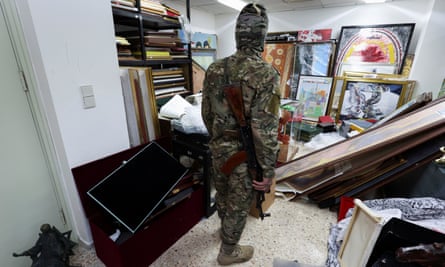He was whisked away without a last message to his people, the aircraft’s transponder deliberately switched off to avoid detection as it departed from an airbase in Syria.
The operation was carried out with such secrecy that even the dictator’s brother reportedly was not informed.
A decade earlier, it was Russian military power that saved Bashar al-Assad’s rule by intervening on his side during what appeared to be a losing civil war he violently attempted to suppress. Now, as rebel troops closed in on Damascus, Moscow provided Assad with a personal escape route.
According to Bloomberg, Assad required some persuading from Russia to leave the country, with Russian intelligence agents orchestrating his escape to Moscow.
Assad’s travel options were always going to be limited. As a pariah on the global stage, his two major allies, Russia and Iran, were the obvious places for refuge.
By choosing Moscow, observers suggest, Assad opted for a familiar place that aligned with his lavish habits, while also selecting a refuge with relative geopolitical stability.
“Bashar and his family are avowedly secular, even though they identify with the Alawite sect, so Russia always had more appeal than Iran in that sense,” said David Lesch, a Syria expert at Trinity University in Texas who has met with Assad on multiple accusations.
Russia, whose leader, Vladimir Putin, is under an arrest warrant from the international criminal court, is also less likely to face pressure or incentives to hand Assad over to those seeking to prosecute him.
“In Assad’s mind, Russia and Vladimir Putin can better protect his family from extradition or any other attempts by the international community to bring him to justice,” Lesch said.
According to Lesch, Russia is likely to provide better medical care for Assad’s wife, Asma, who was diagnosed with leukaemia in May. The British-born and raised Asma has been accused of using her British education and western style to try to mask the brutality of her husband’s crackdown on dissent.

Russia’s ties with the Assad family go back to the 1970s when Assad’s father, Hafez al-Assad, hardened Syria’s place in the Soviet sphere.
In 2015, the relationship between the two countries received a fresh boost after Putin’s intervention in Syria’s civil war.
In the years that followed, Assad’s children, along with other offspring of the Syrian elite, spent their holidays at summer camps in Russian-annexed Crimea. Assad’s eldest son, Hafez, was sent to study at Russia’s prestigious MGIMO University.
Meanwhile, close cousins and other relatives slowly bought up tens of millions of dollars-worth of properties in Moscow’s prestigious skyscraper district.
But despite Syria’s growing dependence on Moscow, the personal relationship between Assad and Putin had always remained chilly.
While Putin appears to have forged genuine friendships with some world leaders, most notably Silvio Berlusconi, whom he has hosted on wine tours in Crimea, he has kept Assad at arm’s length.
By all accounts, the two leaders remained wary of each other throughout the years, with Moscow often frustrated by what it perceived as Assad’s refusal to make even the smallest concessions toward reforming his country or engaging with opposition groups.
When Assad fell, Russian media and state officials were quick to put on a brave face, emphasising the narrative that Assad was to blame for his defeat.
Still, the Kremlin stressed that it was Putin’s personal decision to evacuate Assad.
One former Russian diplomat said that the video of the mob killing of the Libyan leader Muammar Gaddafi in that country’s civil war in 2011 left a grave impression on Russian officials and Putin himself.
“Even if Putin disliked Assad, he was never going to let him get devoured by the rebels,” the former diplomat said.
Facing a position of irrelevance in the Russian capital, Assad is expected to lead a sheltered but comfortable life, as long as Putin remains in charge.
Moscow has become a haven for a motley crew of fugitives, ranging from the former Spartak footballer Quincy Promes to the whistleblower Edward Snowden and the former Wirecard executive-turned-FSB agent Jan Marsalek.
But Assad’s fate most closely mirrors that of Ukraine’s former president, Viktor Yanukovych, who has lived in a multimillion dollar residence in an elite Moscow suburb since his ousting during the 2014 Maidan Revolution.
Much like the videos of Ukrainians touring Yanukovych’s opulent palace, adorned with art and other extravagant possessions, footage emerged last week showing Syrian rebels wandering through Assad’s mansions, stocked with dozens of luxury sports cars and designer bags.

Assad and his family are unlikely to live a public and extravagant lifestyle in Moscow. Instead, under the tight surveillance of Russian security officers, they will probably be hidden away in a secluded estate, shielded from public view.
To sustain his stay in Russia, Assad will likely be able to tap into some of his reported $2bn believed to be hidden around the world in offshore accounts and shell corporations.
Moscow, for its part, will stay silent on its new guest, steering clear of reminding the world that it backed and then hosted a leader who managed to commit the ultimate political sin: being both brutally authoritarian and unsuccessful.
Russian state media have not yet released any pictures of Assad inside the country, a clear sign Moscow is eager to keep him away from the headlines, as it builds ties with the new men in charge of Syria.
“I believe Bashar will maintain a very low profile, perhaps for the rest of his life. I do not see him at all making any sort of political comeback in Syria or anywhere else,” said Lesch.

.png) 4 weeks ago
8
4 weeks ago
8













































